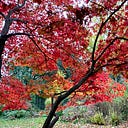I have always enjoyed spending time with nature. As a child, I spent a lot of time outdoors, but my family didn’t travel often. I longed for adventure and the chance to explore. I often sat with my parents’ outdated globe in front of our equally outdated set of encyclopedias inherited from my grandmother. I would close my eyes, spin the globe and stop it. Then I’d read about the country in the encyclopedia and dream of the day I would be able to travel the world. And travel I did…
As a new graduate with few responsibilities, I made travel a priority. I hiked through the Andes, climbed Kilimanjaro, walked through famous national parks around the world. I marveled at the wildlife of the Serengeti and the Galapagos. I admired the calm waters of Ha Long Bay and empty beaches of Zanzibar. Rainforests in Costa Rica, ancient cedar forests in Japan, the redwoods of California. Later, I began to travel constantly for work, but while the business trips took me to fascinating cities, I rarely saw more than the inside of a conference room and another homogenous hotel. So at every opportunity, I hopped yet another flight for a holiday or long weekend. I happily ticked off visits to UNESCO World Heritage sites as my carbon footprint soared. I cringe to think of it now.
That is not to say that I regret the travel or that I gained nothing from it. On the contrary, I learned more from travel than from the privileges of formal education or work experience. The travel was eye-opening, enriching and I felt invigorated by these new experiences. And yet, in all that time, during all those trips, I never experienced the profound connection to nature that I have found in 2020 without traveling at all.
Since the start of the global pandemic, I have found such solace, comfort and grounding in nature. I was fortunate and ever grateful to have a healthy family and the luxury of knowing we had a place to live and plenty of food. Yet I was not immune to the anxiety and worries that many others also faced, juggling the demands of work, childcare, remote learning and never-ending household duties.
In the early days of lockdown, I noticed how I felt on a day spent entirely indoors, versus a day starting and ending with a walk. An hour walking along the river and enjoying the shade of live oak trees made all the difference. Even a short walk around the corner to watch a mama bird bringing breakfast to her nest of growing babies provided a much-needed connection to the natural world and a welcome diversion from the news.
So we embraced Henry David Thoreau’s maxim that “An early morning walk is a blessing for the whole day.” Some days we skipped remote schooling in favor of gardening. We planted a butterfly garden and welcomed the monarch caterpillars to a feast of milkweed. Three new trees will (one day!) bear organic locally grown fruit. We installed rain barrels to capture the bountiful afternoon thunderstorms to water our raised garden beds, growing tomatoes and herbs (among other less successful plantings). Nature responded with food, water and beauty, but also with quiet comfort to steady the anxiety and worries.
And yet, despite all these gifts, this year has been one of natural turmoil. Forest fires ravaged the West Coast while hurricanes battered the Gulf Coast, setting unwelcome records everywhere. Mass extinctions aren’t just happening now — they are accelerating. Nature is crying out, begging for our help. I want to answer that call, in any way that I can.
When presented with such a crisis, so often I have heard (and felt it myself, truth be told) that it does not make a difference if one person recycles or avoids meat or offsets their carbon emissions. And yet, it does make a difference. It’s a tiny difference, but one more milkweed plant to help a handful of caterpillars become monarch butterflies is better than none at all.
True, we need big action from governments and corporations now in order to make the changes needed to avoid irreparable catastrophe. But we also need small actions from individuals — everyone needs to play a part in our shared future and be truly invested in it. Preserving our planet is not only for the benefit of future generations, but for the current generation.
I have already taken action in common ways such as recycling, composting, and offsetting carbon emissions from flights. However, it didn’t take much reflection to realise there is so much more I could be doing — both with my actions and my words. I can look for even more ways to reduce, reuse and recycle. I can evaluate each purchase, each investment, each trip I take, each decision I make through the lens of sustainability.
Equally important, and far more difficult for me, is to use my voice. I have never been particularly outspoken — I am a private person and tend to keep my opinions to myself unless asked directly. I have strong beliefs and quietly support causes close to my heart, but I avoid speaking out, not wishing to call attention to myself, appear judgmental or impose my beliefs on others. However, I’ve realized that there are ways to balance my introverted personality with the need to share my choices and encouraging others to make sustainable choices. In this, I take inspiration from words of the late Ruth Bader Ginsburg: “Fight for the things that you care about but do it in a way that will lead others to join you.”
Therefore, this article is the first step in my accelerated sustainability journey. I have made a dual commitment to myself and the planet: To examine every area of my life for sustainable improvements, and to talk about my decisions and encourage others to start or accelerate their own sustainability journeys.
